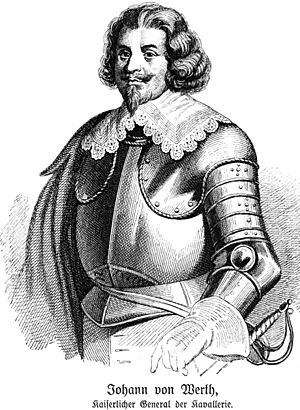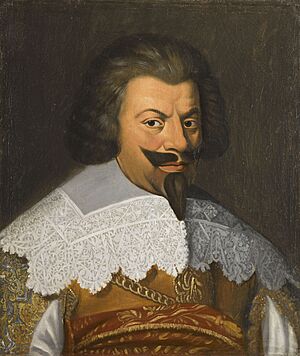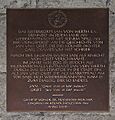Johann von Werth facts for kids
Quick facts for kids
Johann von Werth
|
|
|---|---|

Johann von Werth, imperial general of cavalry
|
|
| Born | 1591 Büttgen, Duchy of Jülich |
| Died | 12 September 1652 Benátky nad Jizerou, Kingdom of Bohemia |
| Allegiance | |
| Years of service | 1610-1648 |
| Rank | General of cavalry |
| Unit | Cuirassier |
| Battles/wars | Thirty Years' War
|
Johann von Werth (1591 – 16 January 1652) was a famous German general. He led cavalry (horse soldiers) during the Thirty Years' War. People also knew him as Jan von Werth or Jean de Werth.
Contents
Early Life and Military Career
Johann von Werth was born in 1591. He grew up in a place called Büttgen in the Duchy of Jülich, which is now part of Germany. His father was a farmer. Johann was the oldest of eight children.
Around 1610, when he was about 19, Johann left home to become a soldier. He joined the Walloon cavalry in the Spanish Netherlands. He likely fought in the War of the Jülich Succession. Later, he served in the Lingen garrison.
When the Thirty Years' War began, he moved to Bohemia. He supported Holy Roman Emperor Ferdinand II. In 1620, he fought in the Battle of White Mountain. In 1622, he helped capture Jülich and was promoted to lieutenant. He also took part in the Battle of Fleurus (1622).
Rise to Fame
In 1630, Johann von Werth joined the Bavarian army. He became an Oberstwachtmeister in a cavalry regiment. By 1632, he was in charge of his own regiment. He quickly became known as a fast and brave cavalry leader.
His skills were especially clear at the Battle of Nördlingen (1634). After this big battle, the Emperor made him a Freiherr (a type of baron). The Elector of Bavaria promoted him to Lieutenant Field Marshal. Around this time, he also gave his soldiers muskets (a type of gun) to use along with their swords.
Raids and Capture
In 1635 and 1636, Werth led his cavalry into Lorraine and Luxembourg. He even planned to attack France itself. In July 1636, he started a raid from the lower Meuse area. His horsemen reached Saint-Denis, near Paris. A large French army then forced them to retreat.
This raid was remembered for a long time. People in France even used "Jean de Wert" as a name to scare naughty children.
In 1637, Werth was back in the Rhine valley. He stopped enemy supplies, helped towns under attack, and surprised enemy camps. In February 1638, he defeated the Weimar troops at Rheinfelden. But soon after, he was captured by Bernhard of Saxe-Weimar.
Werth hoped to be exchanged for the Swedish field marshal Gustaf Horn. However, Bernhard had to give Werth to the French. Werth was taken to Paris, where people celebrated his capture. He was treated well in prison and visited by important ladies. He said that only his word of honor kept him there. He was finally released in March 1642. This was because the Imperial government did not want Horn to lead the Swedish army.
Later Campaigns and Retirement
When Werth returned to the battlefield, he was a general of cavalry. He served the Imperial, Bavarian, and Cologne armies. His first campaign against the French marshal Guebriant was quiet. But in 1643, he helped win a surprise victory at the Battle of Tuttlingen.
In 1644, he was in the lower Rhine area. He returned to fight in the Battle of Freiburg. The next year, he played a key role in the Second Battle of Nördlingen. His commander, Mercy, was killed in this battle. Werth briefly led the army until Field-marshal Geleen took over. Werth was disappointed but remained loyal. He used his anger to fight even harder.
In 1647, there was a disagreement between the Elector and the Emperor. Werth tried to move his Bavarian troops to Austria. He feared that the Empire and the Catholic religion would be harmed if the Elector took control of the troops. But his soldiers refused to follow him. Werth barely escaped the Elector's anger and found safety in Austria. The Emperor was thankful for his actions and told the Elector to forgive him.
The last campaign of the war in 1648 was quiet. Soon after the war ended, Werth retired. He lived on the estates he had bought during his career. He died on 16 January 1652, at one of these estates, Benatek, which was a gift from the Emperor. He was buried in the church of Nativity of the Virgin Mary in Benátky.
Legend of Jan and Griet
Johann von Werth's life became a popular legend in the Rhineland and Cologne. This story is often acted out during Karneval celebrations.
The legend tells of a poor farmer named Jan. He fell in love with a girl named Griet. But Griet wanted a richer husband and said no to his marriage proposal. Jan was heartbroken. He met an army recruiter and decided to become a soldier.
Through hard work and good luck, Jan became a general. He won many battles. After capturing a fort called Hermannstein, he led his victorious troops into Cologne. As he rode through St. Severin's Gate, he saw Griet selling fruit at a market.
Griet was filled with regret for turning him down. She cried out, "Jan, who would have thought it?" Jan replied, "Griet, who would have done it!" and rode away.
There are different versions of this story. It has inspired many songs, including one by the rock band BAP in 2001. Johann von Werth's name has been used for centuries. Many military and recreational groups, especially mounted marksmen at Schützenfests and Karneval, are named after him.
Images for kids
See also
 In Spanish: Johann von Werth para niños
In Spanish: Johann von Werth para niños
 | John T. Biggers |
 | Thomas Blackshear |
 | Mark Bradford |
 | Beverly Buchanan |





